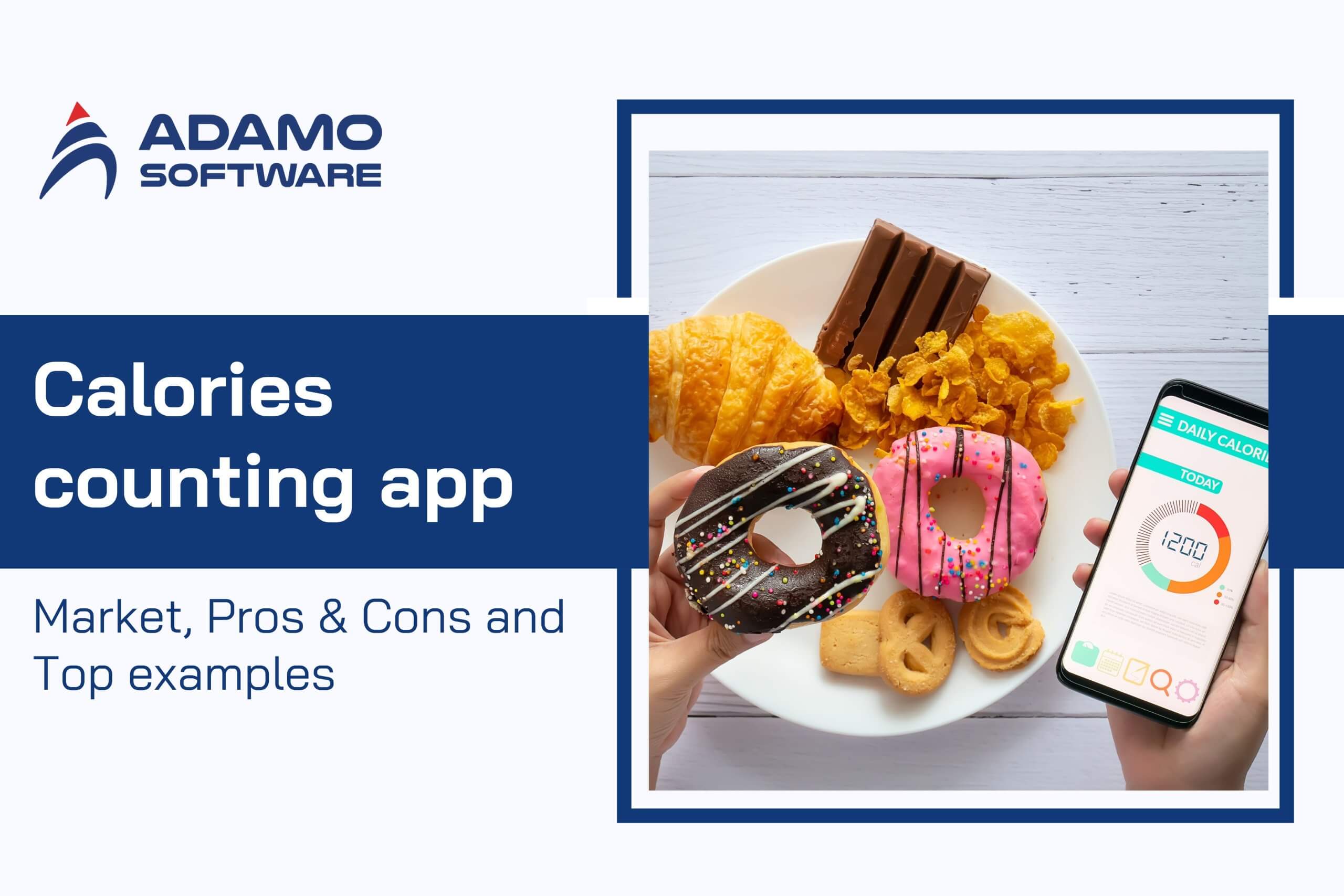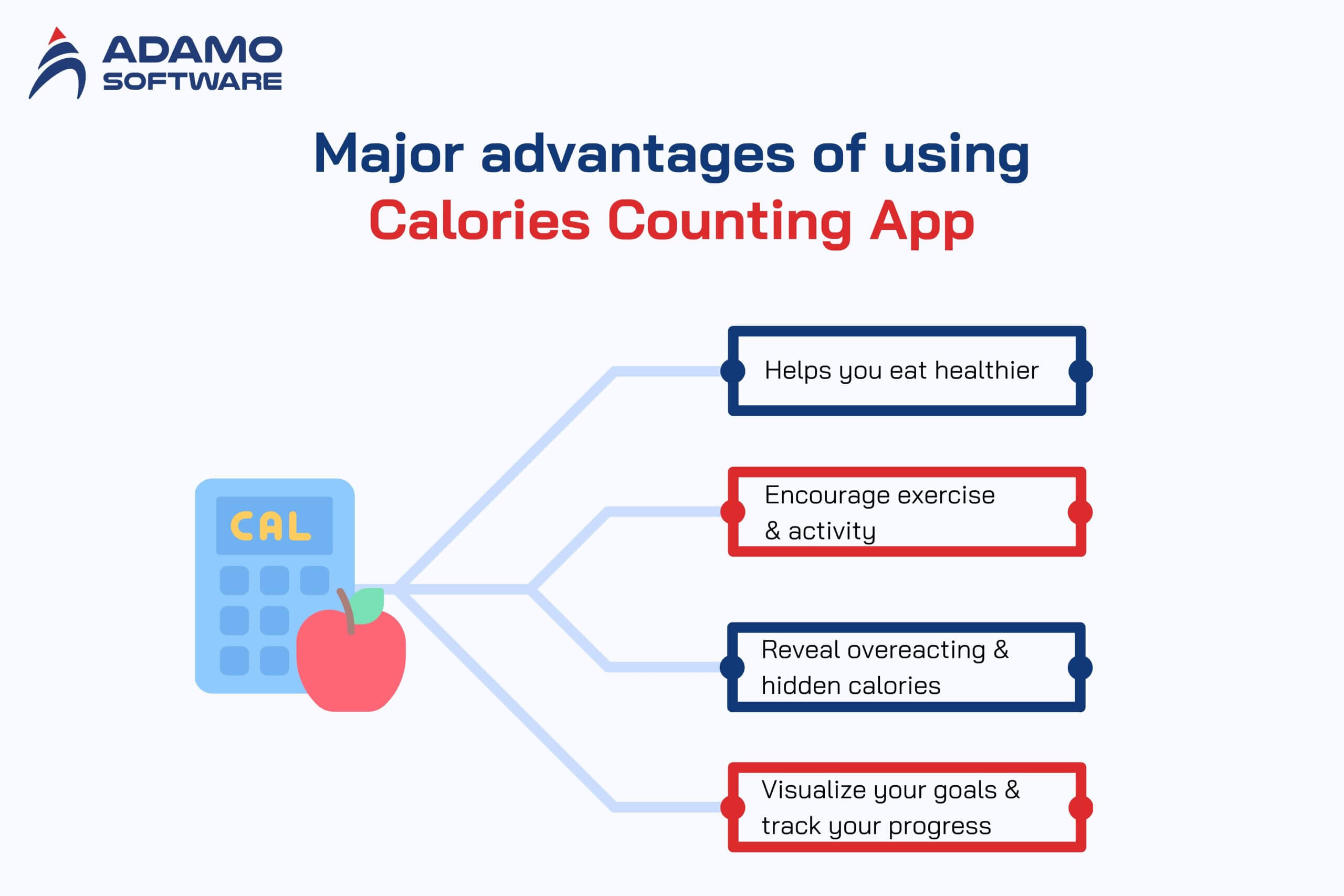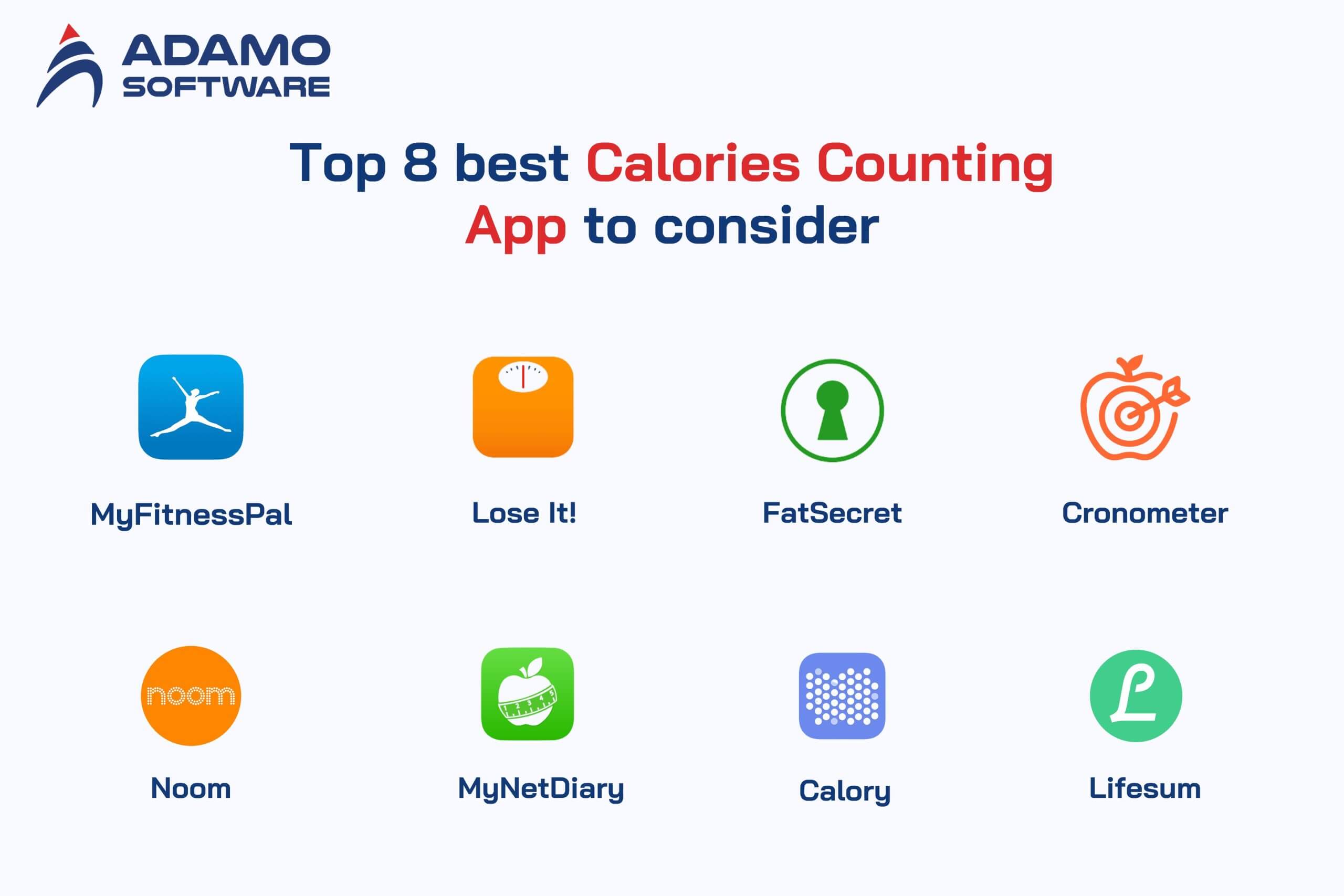Calorie Counting Apps in 2026: Market Trends, Pros & Cons, and Top Picks

Explore the 2026 calories counting app market: key trends, pros & cons, and top apps to fuel your weight loss journey or app development inspiration.
In the age of digital fitness and tracking apps, calories counting app have become a go-to tool for people who want to lose weight, maintain fitness, and better understand their eating habits. With so many different fitness trackers app and calorie counters available today, it can be difficult to develop calories counting app that stand out and compete in the market.
This article will explore the pros and cons of calories counting app. At the same time, explore the 8 best calories counting apps, helping you create a specialized app that stands out in the market.
I. Calories counting app market outlook
In 2023, the global market for calories counting apps was valued at an impressive $2.1 billion. This figure is expected to reach around $4.7 billion by 2032, growing at a CAGR of 9.1% during the forecast period. The rising health awareness among consumers is one of the main drivers behind the growth of the calories counting app market. Besides, a significant factor is the increase in the prevalence of chronic diseases such as obesity and diabetes. Additionally, advancements in technology and the growing number of smartphone users contribute to the demand for digital health tools, including calories counting app.
A major factor fueling the growth of the calories counting app market is the increasing awareness of the importance of maintaining a balanced diet. Additionally, people are becoming more conscious of maintaining a healthy lifestyle. Additionally, with the rising rates of obesity and related health conditions, more and more people are looking for tools that help them track their calorie intake and expenditure, as well as manage their weight effectively. As a result, calories counting app make it simple for users to monitor their food intake. They can also help them make healthier choices and achieve their fitness goals. Additionally, these apps’ convenience and real-time feedback have contributed significantly to their widespread adoption.
Another key factor driving the growth of the calories counting app market is the addition of advanced features. Today’s calories counting app can provide personalized recommendations for each user, such as meal planning and integration with other health and fitness tracking devices. Artificial intelligence and machine learning algorithms enhance the functionalities of these apps, making them more accurate and user-friendly. Technological advancements have made calories counting app more appealing to a wider audience. This includes fitness enthusiasts, those looking to lose weight, and those dealing with chronic health issues.
Lastly, the growing digital health and fitness trend is also a major factor in expanding the calories counting app market. Unsurprisingly, the impact of the COVID-19 pandemic has accelerated the adoption of digital health solutions, such as taking care of your health remotely from home instead of visiting a hospital. The convenience of accessing health and fitness information through mobile health apps has also increased the demand for calories counting app. Moreover, integrating social interaction features in these apps has also allowed users to share their progress and connect with a community of like-minded people. This has further contributed to their popularity.
II. Major advantages of using calories counting app
Many people have lost weight and maintained a healthy lifestyle thanks to the benefits of calories counting app. However, some people think counting calories is outdated and ineffective. This section will explore some of the advantages of using a calorie counting app.

1. Helps you eat healthier
The first benefit of calories counting app is that it helps users maintain healthy eating habits. Users can identify patterns and make better food choices by counting calories to track meals, snacks, and everything else throughout the day.
For example, they may be surprised to see how many calories are actually in a food they love. Once they know that, they can limit their intake of that food or look for a healthier option. There is no cheating yourself when users log their meals with a calories counting app.
2. Encourage Exercise and Activity
Maintaining an exercise routine can be difficult. Therefore, many calories counting app allow you to integrate your exercise routine into your nutrition tracking.
For example, users can use a calories counting app like MyFitnessPal to enter their cardio or strength training for the day where they log their meals. Once you add your workout, the app will add it to your daily burned calories. This allows you to see exactly how your workout is helping you reach your goals.
Tracking your workout progress will motivate you to get out of bed and start exercising. Users will feel motivated to stay active when they see the calories their workout is burning.
3. Reveal Overeating and Hidden Calories
Knowing if we eat too many calories at each meal can be hard. With calories counting app, users can track everything they eat, from the little things that add up. For example, it could be the hidden calories in olive oil drizzled on a salad or the sugary fruit juice that we think is healthy. Tracking every calorie intake will help users better understand the hidden calories in the foods they consume daily.
Overall, monitoring your calorie intake can provide valuable insights into where you might be overindulging.
4. Visualize Your Goals and Track Your Progress
Of all the benefits of calories counting app, the main one is that it allows users to visualize their goals and track their progress toward them. By setting goals to see where they are, they can motivate themselves to make better decisions about what they put into their bodies.
Calories counting app can be a companion to users during their workouts. It allows them to see what they are eating, the nutrients they need more of, and the exercises they are doing, and it also tracks their progress to keep them honest with themselves.
III. Drawbacks when applying food calories counting app
Tracking your calories every day can feel tedious and boring, especially if you’re short on time. On top of that, calorie counting might leave some people feeling anxious about overeating. Let’s dive into the downsides of using calorie counting apps.
1. Time-Consuming Food Entry Systems
Some people live busy lifestyles and often eat on the go or snack on processed foods. Counting calories can be extremely time-consuming and inconvenient. Therefore, using an app to log the ingredients in each meal feels like another chore and is not the way to form a habit.
Instead of counting calories, another option is to use the Food Diary & Weight Tracker app. This app requires users to log each meal as healthy or unhealthy simply. It emphasizes accountability without falling into the trap of logging every gram of saturated fat, fiber, and sugar.
2. Inaccurate Information
Not all food labels are 100% accurate. Unfortunately, the same goes for calories counting app. They can also have database errors or rely on faulty information from user-added entries. As a result, the calories users track can be inaccurate and inconsistent.
As a result, these apps have to store and maintain a large variety of foods and their nutritional data. This is why calorie counting apps can have false information and hinder the diet tracking experience.
3. Obsessive Behavior
Restricting yourself to a certain diet and constantly logging food and drinks can become addictive and compulsive for users. Additionally, continually worrying about whether you are consuming too many calories and how much exercise you are doing can become an unhealthy obsession. This is the opposite of its intended effect.
So, viewing calories counting app as a guidance tool is best. Developers should guide their users to focus on their feelings and experiences rather than raw data. Listen to what your body tells you and avoid developing negative eating habits by making food logging too overwhelming.
4. Unrealistic Weight Loss Goals
Calories counting app does not necessarily mean that users will lose weight. Success comes from the actual changes they make to their diet and exercise.
It is part accountability and part quantitative dieting. Therefore, it’s hard to judge how much food a user eats when they’re only paying attention to their hunger levels because the type of food is just as important as the quantity.
While a calorie counting app can help your users on their weight loss journey, it’s not the key to success. It’s them. That’s an important distinction to keep in mind before anyone puts their trust in a calorie counting app.
IV. Top 8 best calories counting app to consider

1. MyFitnessPal
Regarding calories counting app, MyFitnessPal is one of today’s most popular tools. The app lets you track your weight and calculate your daily recommended calorie intake. It also has a well-designed food diary and exercise log, making it easy for users to track their progress. Its homepage provides a clear picture of the calories that the user has consumed during the day. Additionally, the tool shows the recommended calories remaining and the calories burned during exercise.
The app also offers community features, such as a forum for chatting with other users. The forum includes such issues as:
- Conversations
- Recipes
- Advice
- Personal success stories
– Pros
- It has the largest database of any diet tracker
- It has a wide variety of restaurant dishes
- Offers the ability to download recipes online and calculate calories per serving
- Ability to “quickly add” calories when users don’t have time to log an entire meal
– Cons
- Since many users upload most foods, the calories aren’t always 100% accurate.
- There may be multiple entries for the same product.
- It is difficult to edit portion sizes in the database, making it difficult if the portion size is smaller or larger than the listed portion size.
- Studies have linked MyFitnessPal use to eating disorders.
2. Lose It!
Lose It! is another health tracking app with a food and exercise diary. Users can also connect a pedometer or other fitness device. The app has a comprehensive food database and icons representing each food entry, making adding new foods a breeze.
In addition, Lose It! also has a barcode scanner for packaged foods. It can save common foods for quick entry next time. Additionally, it allows for daily and weekly totals and shows users’ weight changes on a graph. Lose It! also provides them with access to an active chat community.
Pros
- It has a comprehensive food database with popular restaurants, grocery stores, and branded foods, all of which are verified transparently by the app’s team of experts
- The app allows you to set reminders to log meals and snacks
Cons
- It’s hard to log home-cooked meals or calculate their nutritional value
- Difficult to navigate
- Can’t track micronutrients
3. FatSecret
FatSecret is a free calorie counter that includes features like:
- food diary
- nutrition database
- healthy recipes
- exercise log
- weight chart
- diary
The app has a barcode scanner that makes it easy to track packaged foods. Its homepage also displays the user’s total calorie intake, the amount of carbohydrates, proteins, and fats for the day, and each of their meals. This calorie counter app is very user-friendly. It also has a chat community, allowing users to exchange success stories and share tips and recipes.
The FatSecret calorie counting app also offers a feature called “Challenges.” Users can create or participate in diet challenges in a closed group.
Pros
- It has a comprehensive food database with a wide range of supermarket and restaurant foods
- Can highlight foods submitted by other users to verify if the information is accurate
- It can show net carbs, which is useful for those on low-carb diets
Cons
- It has a cluttered interface and can be confusing
4. Cronometer
Cronometer allows you to track easily:
- diet
- exercise
- weight
This calories counting app provides users with a useful food intake and exercise database, especially for pregnant women. They can also let Cronometer know if they are following a specific diet, such as:
- pale
- low carb
- low-fat vegetarian
In addition, Cronometer is especially useful for tracking micronutrients such as vitamins and minerals.
Pros
- Easy-to-use interface
- Allows data to be synced from health devices to the app
- Allows weight, body fat ratio, sleep
- Track all macronutrients and essentials such as vitamins, minerals, and trace elements.
Cons
- It allows adding home-cooked recipes on the website, not on the app. However, these items will be available later in the app.
- No user community feature
5. Noom
Noom is more than just a calorie counting app; it’s an app designed to help you lose weight and keep it off using psychological, therapeutic, and cognitive behavioral approaches.
The app asks for specific information, such as:
- age
- height
- weight
- gender
- lifestyle
The app uses this information to create a calorie budget — an estimate of how many calories you should consume daily. The app then uses your calorie budget to help you achieve a deficit. Noom encourages you to track how many calories you consume each day and weigh yourself at least once a day. The app also helps you plan your diet without restrictions or limitations on certain foods. On the other hand, the app emphasizes tracking calories and nutrients to support weight loss. Noom’s pricing varies depending on the length of the recommended plan.
Pros
- No foods or foods are banned
- Promotes positive lifestyle changes rather than temporary ones
Cons
- No free version
6. Lifesum
Lifesum is a calorie counting app that teaches you how to live healthier. In addition to tracking calories and macronutrients, Lifesum offers a food and meal rating system that explains in detail whether foods are nutritious and whether your meals are healthy or unbalanced.
However, no foods are off-limits, and the app uses constructive language, not categorizing foods as “good” or “bad”.
In addition, Lifesum tracks:
- water intake
- body measurements
- exercise
The app adjusts your daily calorie intake based on the calories burned during physical activity.
Lifesum is easy to use. The app’s home page shows your total calorie and macronutrient intake and a breakdown of foods and calories in each meal, which you can record manually or with a barcode scanner. You can also create food, meals, and recipe entries.
Pros
- A food and meal rating system created to motivate healthier eating choices.
- Easy food logging and a clean, uncluttered interface
- Educational content
Cons
- Potential errors in user-uploaded food entries,
- Automatically syncs with health apps like Apple Health and Google Fit but requires a premium upgrade to sync with other fitness apps.
- Free recipes are available on the website, but a premium subscription is required to access them through the app.
- No online support community
7. MyNetDiary
MyNetDiary is a comprehensive, visual calorie tracker that provides advice and feedback to motivate you on your health journey. Logging your essential foods is quick and easy. You can do it manually or using a voice diary or barcode scanner. The food diary includes a visual portion guide to help you measure your body’s needs more accurately.
It also features a food scoring system that mimics how dietitians score foods based on nutrition labels or nutrient profiles and portion sizes. This feature is designed to help you compare foods to find the best foods and improve the quality of your diet.
Pros
- It has a food categorization system to help improve the quality of your diet
- It includes meals, weight, water, blood sugar reminders, and medication tracking
- Syncs with health apps
- It provides access to an online community that connects you with MyNetDiary users and nutritionists
Cons
- Syncs with health apps like Apple Health, but integration with fitness apps is only available with a premium account
8. Calory
If users are looking for the simplest and easiest caloring counting app, Calory might be perfect. With Calory, users can log calories or food consumed. However, the app only tracks their calorie intake. It has a home page with a bar chart showing the percentage of calories consumed and calories remaining for the day. The app then calculates when they set a goal. However, users can also customize their calorie goals manually.
Pros
- Reminders to log calories
- A food database integrated with the basic USDA food database
Cons
- It only tracks daily calories; a premium upgrade is required for long-term calorie tracking.
- The USDA database can be difficult to use
- It only syncs with Apple Health
- No social community
V. Choose Adamo Software to turn your calories counting app idea into reality
Creating a calorie counting app is a complex process, which is why it’s important to partner with an experienced app development company. If you want to turn your calorie counter app idea into reality, Adamo Software is the partner you need.

We have the skills and experience to turn your vision into reality. We are here to support you every step of the way—from planning and development to troubleshooting and fine-tuning. We understand the unique challenges of healthcare software development and will make sure your app stands out in the market. Trust us to turn your vision into reality and help you create a top-notch calorie counter app. Let’s get started!





